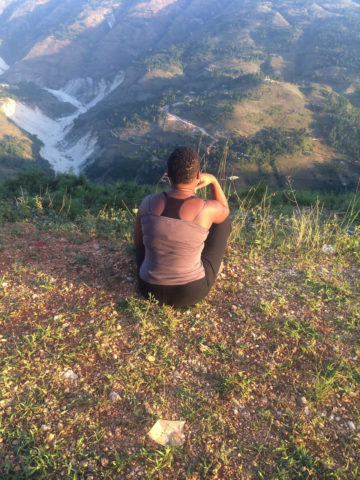To be honest, the month of January has been weird for me for almost a decade now. I find myself stuck between being super grateful to have made it to a new year, simultaneously celebrating the emergence of the world’s first black republic on January 1st as well, while also finding myself in a holding pattern until January 12th, which marks another game-changing chapter (albeit a less glorious one) in Haiti’s history.
 Whereas 7.0 earthquakes are standard occurrences in many parts of the world, in my parents’ homeland, one of these earthquakes gave us up to 300,000 ancestors in a matter of 35 seconds when the devastation claimed their lives that day.
Whereas 7.0 earthquakes are standard occurrences in many parts of the world, in my parents’ homeland, one of these earthquakes gave us up to 300,000 ancestors in a matter of 35 seconds when the devastation claimed their lives that day.
Whether I like it or not, each year for the past eight years, I subconsciously re-live two of the longest days of my life; I waited in agony to learn if my father – who was in Haiti visiting family at the time – was still alive. Then, I blink and it’s my mom’s birthday on January 15th. Too wide a range of emotions in just two weeks.
Every. Single. Year.
So I don’t say much or do much in January. Public commemorations for the quake rarely find me in their midst and instead, I do my best to use this time to reflect, rest, and re-dedicate myself to championing institutional development, improved governance, and lasting positive change both in Haiti and in countries like it throughout the world. This year was to be no different. That is… that was until my phone started buzzing non-stop late Thursday evening, as folks checked in on me after the latest disparaging remark about my Haiti from the U.S. president.
In the words of a close colleague, I refuse to let unsurprising, but still derogatory, remarks overshadow the real differences that Haitians in Haiti as well as those of us abroad continually attempt to make – many long before the earth shook. I also will not dismiss the real shortcomings and systemic barriers that inhibit Haiti’s potential from being fully realized in ways that are so attainable, yet so far off for reasons that pre-date me by decades and even centuries.
That is not the point.
The point is, most Haitians, we remember. We remember when Jean Baptiste Point du Sable – a Haitian man – founded the City of Chicago in the 1770s. We also remember when 545 Haitian troops arrived in Savannah, Georgia in 1779 as the largest black regiment in the American Revolution to fight in what became the bloodiest battle against the British; before many returned home – including one of our founding fathers Henri Christophe (who eventually constructed the largest fortress in the Western Hemisphere) – to become our own revolutionary heroes. Speaking of which, we remember creating the circumstances that led to the U.S. more than doubling its size as a result of the Louisiana Purchase, when cash-strapped Napoleon desperately sold it, practically for pennies, in April 1803 right before we defeated the French in our final battle that November.
And how could we possibly forget when W.E.B. DuBois became the first black man to earn a PhD from Harvard in 1895?
We remember these contributions of Haitian people to the American fabric then, as well as the continuing contributions that are certainly being made now. Some of us are American by circumstance, Haitian by blood, and all human by design – like me – and special treatment is never what we’ve been after in this country or in any of the other countries around the world where we’ve found ourselves.
Basic respect, however? YES.
All this aside, maybe the day will come when America finally decides to put some respect on it. If not a respect for our humanity as people, at least for the lasting contributions that my Haitian kinfolk have made, and continue to make to this society… even though today’s establishment revels in denigrating us at every turn.
As a visionary, I can only hope that my birth country finds the integrity to live up to its foundational creed of “all [people] are created equal” for the first time in its existence as I continue to work towards actualizing Haiti’s ability to effectively manage its own affairs someday (soon).
Until then, press on we must. There’s real work to do.



About The Author: Vanessa L.
More posts by Vanessa L.